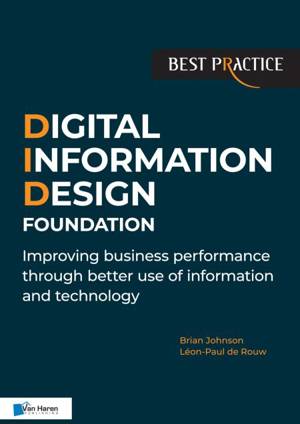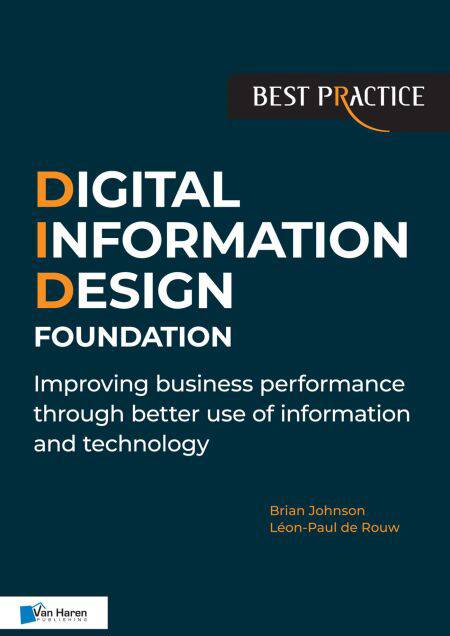
Bedankt voor het vertrouwen het afgelopen jaar! Om jou te bedanken bieden we GRATIS verzending (in België) aan op alles gedurende de hele maand januari.
- Afhalen na 1 uur in een winkel met voorraad
- Gratis thuislevering in België
- Ruim aanbod met 7 miljoen producten
Bedankt voor het vertrouwen het afgelopen jaar! Om jou te bedanken bieden we GRATIS verzending (in België) aan op alles gedurende de hele maand januari.
- Afhalen na 1 uur in een winkel met voorraad
- Gratis thuislevering in België
- Ruim aanbod met 7 miljoen producten
Zoeken
Business Information Management, Digital Information Design (DID) Foundation E-BOOK
Improving business performance through better use of information and technology
Brian Johnson, Léon-Paul de Rouw
€ 49,00
+ 49 punten
Omschrijving
Digital Information Design (DID) is primarily a business information management (BIM) model. As with any model it is used to help you to describe problems and test potential solutions. DID is not like any other method or framework model; it is independent of any other existing model or framework and does not claim to manage the entirety of the design of business information services. DID identifies useful and widely used best practices that are designed specifically for use in any phase of business information service development from idea, conception, specification, design, test, handover, service management and operation, or managing architectural issues or hardware and software installation.
Primarily, DID was developed to manage the quality of information, and how to put it to good use. The DID model has been designed for you to identify what you need and when you need it when designing business information services and as a broad guide, identifies key points in existing frameworks that are particularly useful. The model is wholly independent of all other frameworks (including BiSL and BiSL Next in which the basic design is rooted). You can choose and use whatever you wish, the model will help you to assess the validity of your choice(s) and identify strengths and weaknesses in your approach.
The DID model focuses on the common languages to describe key elements of design (need and value, mission and capability), key business information perspectives (business, information/data, services and technology) and the high-level domains (governance, strategy, improvement and operation) that must be managed in order to effectively run any business.
DID helps you to identify only what you need to ensure that business information design reflects what is needed by your enterprise. The model can be used entirely separately from the framework level guidance discussed and it can be used at any level in the organization.
The essentials of DID are explained in two books: this book, Foundation and the Practitioner book that will be published later.
Primarily, DID was developed to manage the quality of information, and how to put it to good use. The DID model has been designed for you to identify what you need and when you need it when designing business information services and as a broad guide, identifies key points in existing frameworks that are particularly useful. The model is wholly independent of all other frameworks (including BiSL and BiSL Next in which the basic design is rooted). You can choose and use whatever you wish, the model will help you to assess the validity of your choice(s) and identify strengths and weaknesses in your approach.
The DID model focuses on the common languages to describe key elements of design (need and value, mission and capability), key business information perspectives (business, information/data, services and technology) and the high-level domains (governance, strategy, improvement and operation) that must be managed in order to effectively run any business.
DID helps you to identify only what you need to ensure that business information design reflects what is needed by your enterprise. The model can be used entirely separately from the framework level guidance discussed and it can be used at any level in the organization.
The essentials of DID are explained in two books: this book, Foundation and the Practitioner book that will be published later.
Specificaties
Betrokkenen
- Auteur(s):
- Uitgeverij:
Inhoud
- Aantal bladzijden:
- 230
- Taal:
- Engels
- Reeks:
Eigenschappen
- Productcode (EAN):
- 9789401807234
- Verschijningsdatum:
- 10/03/2021
- Uitvoering:
- E-book
- Beveiligd met:
- Adobe DRM
- Formaat:

Alleen bij Standaard Boekhandel
+ 49 punten op je klantenkaart van Standaard Boekhandel
Beoordelingen
We publiceren alleen reviews die voldoen aan de voorwaarden voor reviews. Bekijk onze voorwaarden voor reviews.












